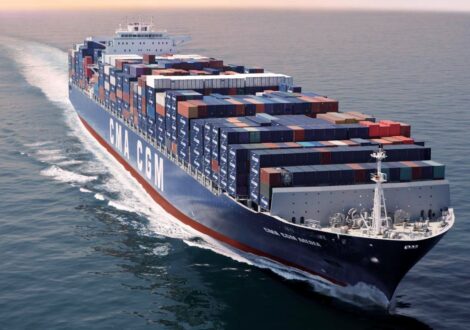- By TOP CHINA FREIGHT
- August 5, 2025
- Shipping
Shipping from China to France is a key part of global trade, linking China’s manufacturing strength with France’s strong economy and high demand for goods. France imports a wide range of products from China, including electronics, machinery, and consumer goods. To ensure timely and cost-effective delivery, it’s essential to understand the processes involved in shipping to France. This guide outlines the key steps, methods, and considerations for shipping from China to France, helping you make informed decisions for your business or personal imports.

1.Why Ship from China to France?
France’s strategic location within Europe makes it a central hub for international logistics. With major ports like Le Havre and Marseille, and airports such as Charles de Gaulle in Paris, the country is equipped with excellent transportation infrastructure that facilitates smooth cargo movement. Additionally, France’s economic ties to China have grown stronger over the years, making it a popular destination for a wide range of products.
2.Key Industries Importing from China to France
Smartphones, laptops, and other high-tech products.
Clothing and accessories for French retail markets.
Industrial machinery for various French industries.
Components for France’s automotive industry.
3.Main Shipping Methods from China to France
Shipping from China to France can be done through several methods, each with its advantages and limitations. The most common shipping methods are sea freight, air freight, and rail freight.

Sea Freight
Sea freight remains the most popular and cost-effective method for shipping large quantities of goods from China to France. With major Chinese ports such as Shanghai, Shenzhen, and Ningbo, and French ports like Le Havre and Marseille, sea freight offers a wide range of options.
FCL (Full Container Load):
Ideal for large shipments, FCL offers dedicated container space, reducing the risk of damage or delays.
LCL (Less than Container Load):
Best for smaller shipments, LCL allows you to share container space with other importers, making it more affordable.
Transit Time:
Typically, sea freight from China to France takes around 30 to 40 days, depending on the departure and arrival ports.

Air Freight
For urgent shipments, air freight is the fastest method of transportation. Airfreight is best suited for high-value items or time-sensitive goods that need to reach France quickly.
Main Airports in China:
Shanghai Pudong (PVG), Beijing Capital (PEK), Guangzhou Baiyun (CAN).
Main Airports in France:
Charles de Gaulle (CDG), Paris Orly (ORY), Nice Côte d’Azur (NCE).
Transit Time:
Airfreight from China to France typically takes 7-10 days.

Rail Freight
Rail freight has become an increasingly viable option, particularly for large, bulky shipments that don’t need to be expedited. The rail route from China to France passes through key cities like Xi’an, Moscow, and Warsaw, offering a reliable and relatively fast alternative to sea freight.
Transit Time:
Rail freight typically takes between 15 to 20 days, making it faster than sea freight but slower than air freight.
Cost:
More affordable than air freight, but generally more expensive than sea freight.
4.Shipping Costs from China to France
Estimated Shipping Costs Overview
| Shipping Method | Type | Estimated Cost (USD) | Notes |
|---|---|---|---|
| Sea Freight | FCL (Full Container Load) | $1,500 – $3,000 per container | Varies by container size (20ft vs 40ft) and route |
| LCL (Less than Container Load) | $100 – $160 per CBM | Ideal for shipments under 15 CBM | |
| Air Freight | Standard Air | $5 – $10 per kg | Faster than sea, suited for high-value goods |
| Express Air (DHL, UPS, FedEx) | $8 – $15 per kg | Fastest option, ideal for documents and small parcels | |
| Rail Freight | FCL (Full Container Load) | $2,000 – $3,000 per container | Middle ground between sea and air in speed and cost |
| LCL (Less than Container Load) | $130 – $180 per CBM | Economical for medium-size shipments |
Note: These are average estimates. Prices may fluctuate based on fuel surcharges, peak seasons, and shipping lane demand. Always request a custom quote for accurate pricing.
5.Important Considerations for Shipping from China to France
When shipping goods from China to France, there are several factors to consider to ensure your cargo reaches its destination smoothly and cost-effectively.
Customs and Documentation
Both China and France have specific customs regulations that must be followed to avoid delays and penalties. It is crucial to ensure that you have all the necessary documentation, including:
- Commercial Invoice: A detailed invoice outlining the goods being shipped.
- Packing List: A list of items being shipped, including quantities, dimensions, and weights.
- Bill of Lading: A contract between the shipper and carrier that outlines the terms of the shipment.
- Customs Declarations: Any required forms for clearing customs in both China and France.
Tariffs and Duties
France, as part of the European Union, follows EU regulations on tariffs and duties. Depending on the type of goods you are importing, tariffs may apply, and it’s essential to check the customs duties specific to your product category to avoid unexpected costs.
Insurance
International shipping comes with risks, and purchasing cargo insurance can help protect your goods in case of damage, loss, or theft during transit. Make sure to assess the value of your goods and choose an insurance plan that fits your needs.
Packaging and Labeling
Proper packaging is crucial to ensure that goods arrive in France in good condition. The packaging should protect the items from damage and meet any specific requirements for transport. Additionally, make sure your goods are labeled correctly, including the proper HS (Harmonized System) code, country of origin, and any relevant warnings.
6.Common Issues When Shipping from China to France
1. Customs Delays
Improper or incomplete documentation is one of the most common causes of customs clearance delays in France. Ensuring all paperwork—such as the commercial invoice, packing list, and bill of lading—is accurate and complete is essential.
2. Unexpected Duties and Taxes
Importers often underestimate or overlook applicable tariffs, VAT, and customs duties. Failing to classify goods correctly using the HS code can result in fines or overpayment.
3. Port Congestion
Busy French ports like Le Havre and Marseille may experience congestion, especially during peak seasons. This can cause shipping delays and increased demurrage or storage fees.
4. Communication Gaps
Time zone differences and language barriers between Chinese suppliers and French buyers can result in miscommunication, leading to incorrect product specifications, missed deadlines, or documentation errors.
5. Fluctuating Freight Rates
Sea and air freight rates between China and France are sensitive to global market trends, fuel prices, and demand surges. Without proper forecasting, importers may face unexpected increases in shipping costs.
6. Damaged or Lost Cargo
Poor packaging, especially in LCL shipments, increases the risk of damage during handling. In rare cases, cargo may also be lost in transit, making cargo insurance essential.
7.Step-by-Step: How to Ship from China to France
Step 1: Choose a Reliable Freight Forwarder
Step 2: Confirm Product and Compliance Requirements
Step 3: Decide on the Shipping Method
Step 4: Prepare the Shipment
Step 5: Book and Arrange Pickup
Step 6: Export Customs Clearance in China
Step 7: Transit to France
Step 8: Import Customs Clearance in France
Step 9: Final Delivery
Final Thoughts
Shipping from China to France involves various steps, from choosing the right shipping method to clearing customs and managing delivery logistics. Whether you opt for sea freight for cost efficiency, air freight for speed, or rail freight as a balanced option, understanding the process is key to avoiding delays and extra costs.
By partnering with an experienced China freight forwarder like TJ China Freight Forwarder, you can simplify the process, ensure compliance with French import regulations, and gain access to competitive rates across all major routes.
Ask for a quote
Are you ready shipping from china to France?
Contact TJ China Shipping Forwarder for a fast, accurate, and competitive shipping quote.
FAQs
Q1: How long does it take to ship goods from China to France by sea?
Shipping by sea from China to France generally takes around 30-40 days, depending on the origin and destination ports.
Q2: What are the customs duties for shipping to France from China?
Customs duties in France depend on the type of goods being imported. You should check the HS code for your product and consult the French Customs office for the exact duties applicable.
Q3:Can I ship small quantities of goods from China to France?
Yes, you can ship smaller quantities using LCL (Less than Container Load) or air freight, which are suitable for smaller, less bulky shipments.
Q4: Is air freight faster than sea freight?
Yes, air freight is significantly faster than sea freight. Air freight takes around 7-10 days, whereas sea freight can take up to 40 days.
Q5: Do I need insurance for my shipment from China to France?
While not mandatory, cargo insurance is highly recommended to protect your goods from risks such as damage, loss, or theft during transit.
